Learn and Share
Marketer's Challenge
Currently, marketers face challenges in connecting visitors with the most relevant content in real-time. A keyword search on the website typically returns approximately 500 results, raising concerns about the relevance of the top 4-5 results that visitors truly care about. In Google users tend to click on the top results and this behavior applies to site searches as well. When visitors realize they must navigate through an overwhelming amount of Information they tend to leave.
The context of search keywords has become more important than ever. It's no longer sufficient to simply match keywords with indexed content to display results. Instead, built-in AI is necessary to understand the context and intent of the keywords in a specific setup.
Imagine a girl typing 'period' into a feminine care website's search bar and seeing 'offer period starting Jan 1, conditions apply' as the top result and other non relevant links.

This is where Sitecore AI Search comes into play and helps solve the problem.
Key Highlights of Sitecore AI Search
Intent-Based Search Results
Sitecore AI Search offers personalized search results by building a persona based on a visitor's activities, behaviour, past interaction such as viewing various topics on the website, watching videos, and reviewing FAQs. When a visitor searches for a specific topic, the results are tailored to their interests. For example, if a visitor views content related to personalization and then searches for the keyword "commerce," the search results will include information on how to personalize a commerce site. This feature provides several benefits:
-
Enhanced User Satisfaction: By understanding and addressing the user’s intent, search engines can deliver more relevant results, leading to higher user satisfaction.
-
Improved Engagement: When users find what they are looking for quickly and accurately, they are more likely to engage with the content, spend more time on the site, and explore further.
-
Higher Conversion Rates: For commercial and transactional intents, providing relevant search results can lead to higher conversion rates, as users are more likely to find and purchase the products or services they need
Content Insight
Sitecore AI Search provides valuable insights into which content is performing well, and which is not. It identifies the keywords that help visitors access relevant content. By analyzing this data, significant costs can be avoided, and future strategies can be aligned with the content that is proven to be effective
Auto-Correction Feature
When a word is misspelled, Sitecore AI Search provides suggestions with the prompt "Do you mean," assisting users in rectifying errors and obtaining relevant results. This feature offers several benefits:
-
Improved Accuracy: Auto-correction helps users find what they are looking for, even if they make spelling mistakes or typos.
-
Timesaving: It reduces the need for users to retype their queries, making the search process faster and more efficient.
-
Enhanced User Experience: By providing correct suggestions, auto-correction improves the overall user experience, making it easier to find relevant information.
-
Increased Productivity: Users can focus more on their tasks rather than worrying about spelling errors, which can boost productivity
Basic blocks of Sitecore AI Search
Before delving into the implementation techniques, let's first understand some fundamental building blocks of Sitecore search.
-
Suggested Search Keyword - As users type in the Input Box, the Suggested Search Keywords feature provides real-time suggestions based on the text entered. This helps enhance search accuracy, reduce typos, and suggest relevant terms automatically. These suggestions are generated from popular searches and related content, helping users refine their queries and discover more relevant information quickly

-
Search Results - The "Search Results" section displays content relevant to the user's query, showcasing the effectiveness of the search engine. This section lists results with titles, short descriptions, and sometimes images. Results are sorted by relevance, with options to sort by other criteria such as date or popularity. Designed for easy navigation, this area allows users to quickly find the information they are looking for.
-
Filters - Filters in Sitecore Search allow you to define and limit the content returned in search results. They can be implemented as visible facets for user interaction or operate behind the scenes to tailor the content displayed.
-
Facets - Facets dynamically categorize search results based on attribute values, offering users an intuitive way to refine their search queries. This feature is especially beneficial when managing extensive content inventories
How search work
The infographic below provides an understanding of how search functions in Sitecore. Taking the example of the sitecore.com website, the 'Search' table on the left side illustrates various sources and content that are indexed. You will notice that content is indexed from four different domains: developers, documentation, Sitecore, and symposium. All indexed content is added to a private Azure Open AI model. The search bar at the top processes natural language queries, utilizing the Azure Open AI model to generate natural language answers
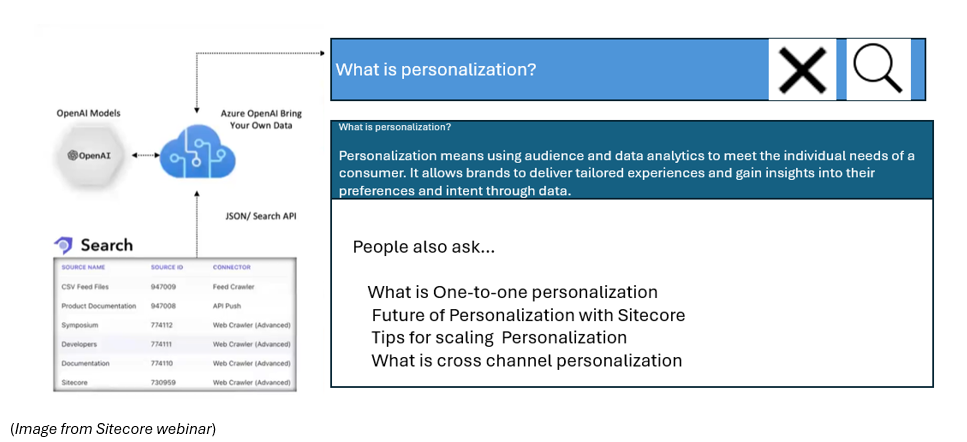
There is also a provision to add chatbot on top and turn this experience into Q&A
Implementation steps: -
- Follow steps mentioned here -https://doc.sitecore.com/search/en/developers/search-developer-guide/getting-started-with-sitecore-search.html
- Implement facets on your website based on a storybook provided by Sitecore
- Go to customer engagement console. This is where 80 % of the work is done
- Define users
- Define domains and attributes .Different attributes have different purposes. Highlighted one defined content type and specify if these can be used as facets to apply filter on
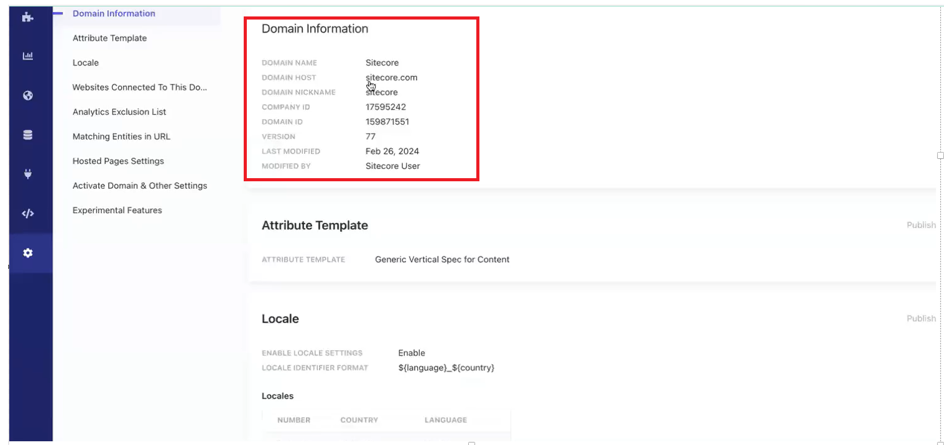
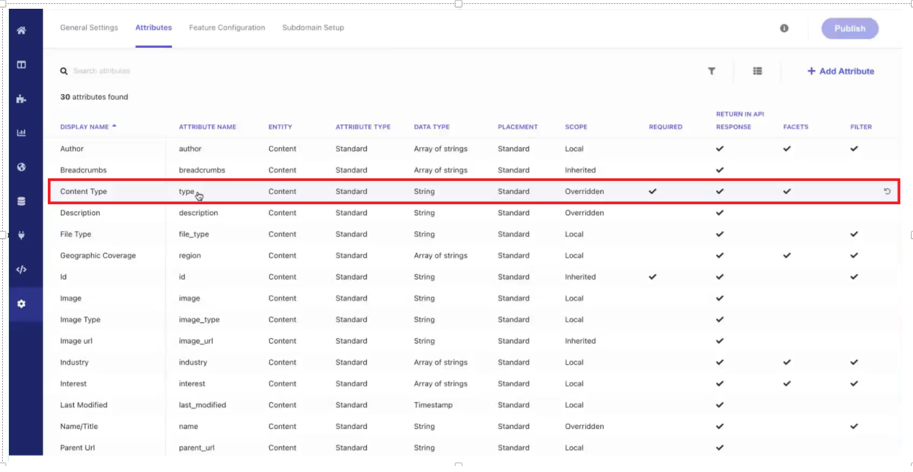
- Set up a crawler to crawl and index content and finally start it. Highlighted are the web crawlers that will crawl the domains as listed in source name.
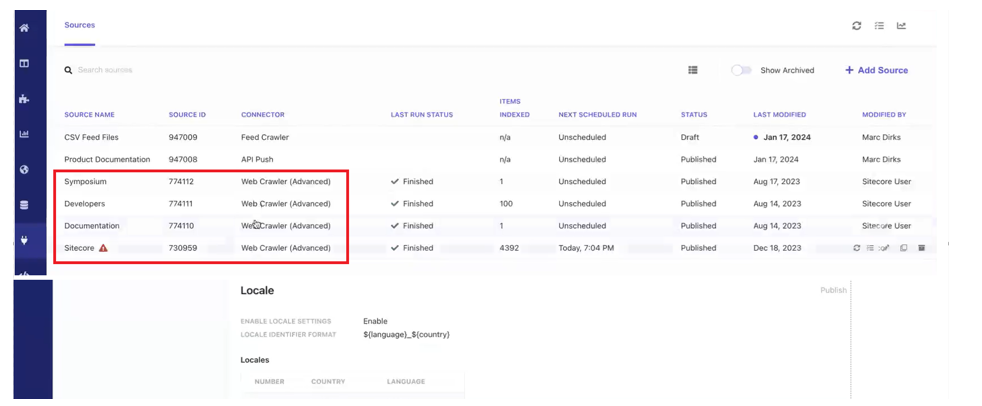
- Once the crawler is initiated, the indexed content will begin to populate the Content Browser. This content is sourced from various origins.
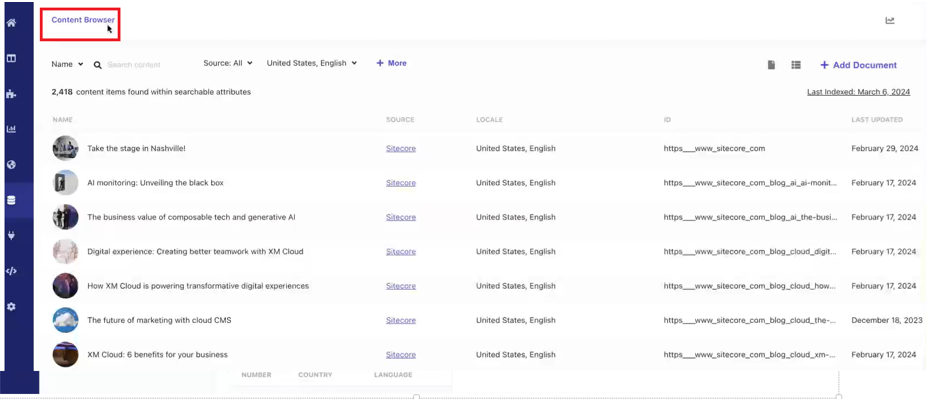
- Define synonyms and use a tool to find keywords, including common terms and misspellings. Add these keywords to the list below. For example, if "digitil" is frequently mistyped word, include it to replacement column with a correct word. Try to make this list as exhaustive as possible.
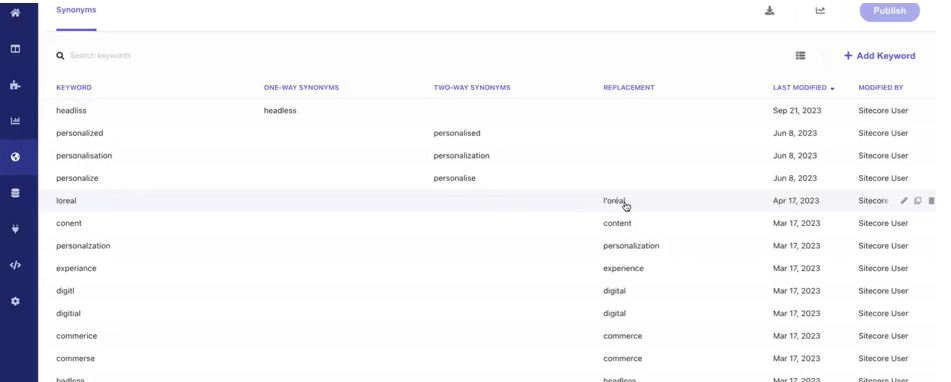
-
Add widget - Various types of widgets are available. These widgets assist in creating the content that visitors will see. For example, if marketers aim to highlight specific content in December, they can use the recommendation widget.
Use Cases of Sitecore AI Search
1. E-Commerce Personalization
AI search helps online retailers provide personalized product recommendations based on user behavior, past purchases, and preferences.
Example: A customer searching for “running shoes” gets AI-powered suggestions for popular brands, size filters, and related accessories like socks or fitness trackers.
2. Content Discovery for Media & Publishing
Media companies use AI search to deliver relevant articles, videos, or blogs based on user interests and engagement history.
Example: A news website personalizes headlines for a user interested in sports, surfacing relevant stories without manual filtering.
3. Customer Self-Service in Support Portals
AI-powered search enhances customer support by quickly surfacing relevant knowledge base articles, FAQs, or troubleshooting guides.
Example: A user searching for “reset password” on a SaaS platform’s support portal gets guided to a step-by-step help article or chatbot assistance.
4. Healthcare & Life Sciences Knowledge Management
Hospitals and medical research institutions use Sitecore AI search to provide doctors and researchers with fast access to medical records, studies, and treatment guidelines.
Example: A doctor searching for “latest diabetes treatment” receives AI-curated results from research databases, clinical trials, and best practices.
5. Higher Education Portals
Universities use AI search to help students find courses, research papers, faculty details, and campus resources efficiently.
Example: A student looking for “online AI courses” gets ranked results based on course popularity, reviews, and enrollment deadlines.
6. B2B & Enterprise Intranets
Companies leverage AI search to improve internal knowledge sharing by indexing business documents, policies, and internal training materials.
Example: A new employee searching for “remote work policy” instantly gets the most updated guidelines from the company’s HR portal.
7. Travel & Hospitality
Travel companies use AI search to provide dynamic recommendations for destinations, hotels, and activities based on user preferences and historical data.
Example: A user searching for “family vacation in Mexico” gets AI-driven suggestions for kid-friendly resorts, attractions, and travel deals.
8. Government & Public Sector Portals
AI search helps citizens find relevant information on services, regulations, and legal documents efficiently.
Example: A resident searching for “tax filing deadline” gets the latest official information and step-by-step filing instructions.
How to measure success ( For business user and Marketer)
At Widget Level
-
Widget Performance - Evaluate how a widget is performing by reviewing requests, views, clicks and CTRs meaning if visitors were able to find information and click on them
-
Widget Funnel - Analyze this to understand where in the funnel visitors are dropping and how this can be addressed
At Keyword Level
-
Keyword performance - This explains how a keyword is performing in certain widgets. Whether they are gaining or loosing. It also tells if search returns no results for keyword indicting that marketers need to start building content around those keywords or should have a replacement keywords
At Content level
-
Top content by views - This explains the content which is viewed the most from the search result page
-
Top Content by click conversion -
-
Biggest gainers/Losers
-
This help marketers understand what content is working and what is not. Helps in optimizing content at the time of migration
Business Outcome and Value
-
Improved website search conversion and engagement rate
-
Search funnel and Click thru rate
-
Increase customer self service
-
Reduce Search maintenance and technical development cost
Conclusion
Sitecore AI search enhances content discovery, personalizes user experiences, and improves engagement across industries. It is particularly valuable in environments where quick, relevant, and personalized search results drive conversions, efficiency, or customer satisfaction. By leveraging Sitecore AI Search, businesses can optimize their content strategies, reduce costs, and ultimately deliver a superior user experience. Embrace the power of AI-driven search to stay ahead in the competitive market and meet the evolving needs of your audience.